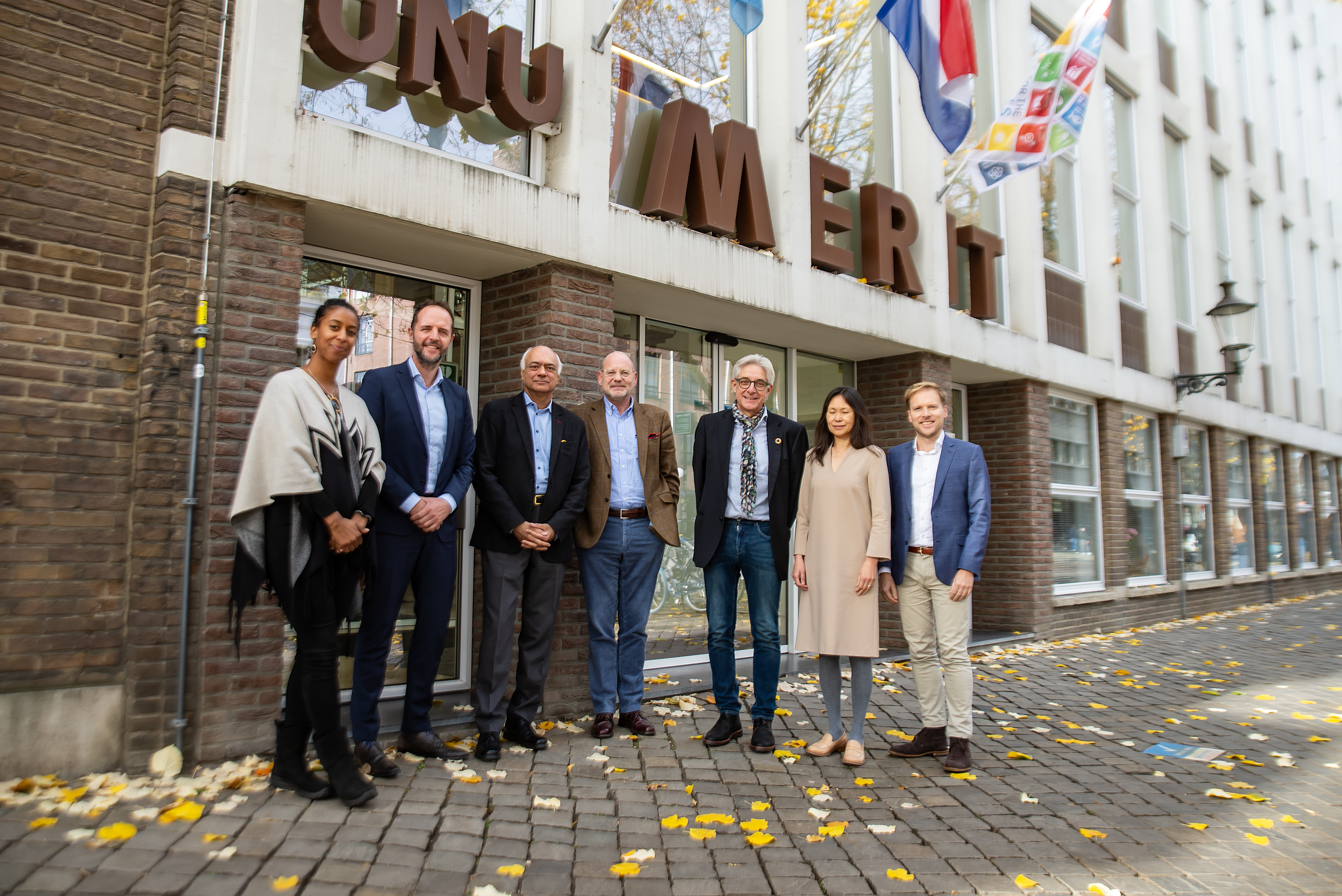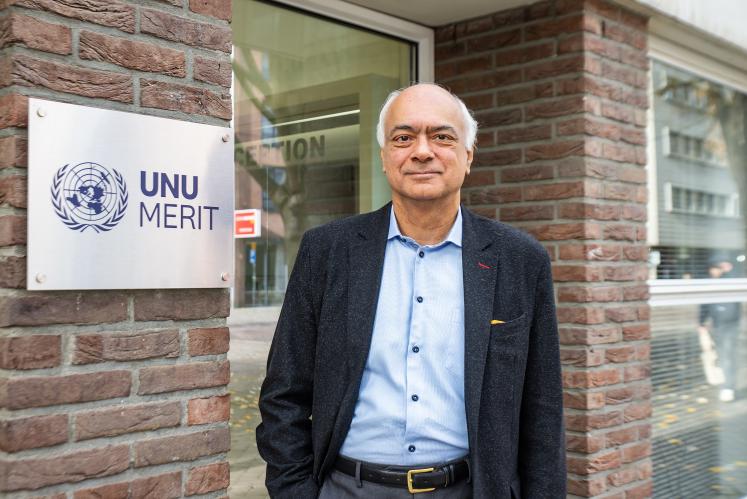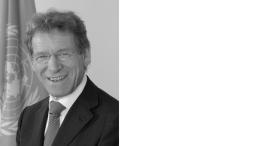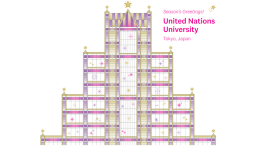When Dr Rohinton Medhora first visited Maastricht in the mid-1990s, the institute that would later become UNU-MERIT was still known as UNU-INTECH. Then a rising development economist, he came to discuss the economics of innovation — a field that has since defined much of his own professional life. Nearly three decades later, he returned to the institute as member and as of September 2025 Chair of UNU-MERIT’s International Advisory Board (IAB), ready to help shape its direction at a time of global uncertainty and transformation.
“I’m a development economist by training, focused on international economics,” he says. “I did most of my studies and got my doctorate at the University of Toronto. I taught there for a few years and then went into a career that was at the interface of research and policy.” That intersection — between evidence, ideas, and implementation — would become his intellectual home. Over a career spanning both academia and policy institutions, Medhora has built a reputation as a bridge-builder: someone who values rigorous research but insists it must inform real decisions.For two decades, he worked at Canada’s International Development Research Centre (IDRC), where he rose to become Vice President of Programmes. He then spent ten years as President of the Centre for International Governance Innovation (CIGI), one of Canada’s leading global think tanks. Both roles, he reflects, “broadened my world view away from what we learned in university to questions of policy, but also fundamental questions of how development happens and where it happens, which quickly led me to questions of technology, innovation and governance.”Today, those three words — technology, innovation, and governance — still define his intellectual compass. “If someone asked me today, I’d say that’s my focus,” he explains. “Technology, innovation and governance.”
UNU-MERIT’s International Advisory Board meeting (L to R): Prof. Erika Kraemer Mbula, Dr. Bas ter Weel, Dr. Rohinton Medhora (IAB Chair), Prof. Philip Vergauwen, Prof. Clemens Kool (UNU-MERIT Interim Director), Prof. Shen Xiaomeng, and Cyril Heuts (Representative of the UM President).
Bridging Research, Education, and Policy
Asked how UNU-MERIT can sharpen its relevance and influence, Medhora doesn’t hesitate: “The intersection of research, education and policy is exactly the space to be, however complex that space might be.” He believes that to have real impact, an institution must not only produce high-quality research but also teach and translate that knowledge into action. “Universities are very good at producing research,” he notes, “but not so good at disseminating it or connecting with policy. Think tanks do the translation, but they don’t produce their own research. Policy on its own cannot work if there isn’t independent evidence being provided to it.” For him, UNU-MERIT’s dual identity — both a UN institute and part of Maastricht University — is a unique comparative advantage. “By straddling the UNU think-tank world and the university world,” he says, “you’ve already self-represented the core of what should be going on.” The balance, in his view, is delicate but powerful: “You need both the rigour of academia and the agility of policy work.”This conviction also shapes how he sees the role of education at UNU-MERIT. “Teaching is not just about passing on knowledge,” he reflects, “it’s about equipping people to act on that knowledge — to work in governments, international organisations, and civil society with an understanding of what evidence means.”
Relevance in a Fractured World
Our conversation turns to the state of multilateralism. In an era of geopolitical fragmentation and eroding trust in institutions, how can a UN-affiliated institute like UNU-MERIT remain credible and impactful? “The global governance system is going through challenges,” Medhora admits. “We live in a once-in-a-lifetime era in which the rules of the global governance game are all up for grabs.” He sees this moment not as a threat, but as a rare opportunity for institutes like UNU-MERIT. “There’s a brilliant opportunity for something like the MERIT group to join these discussions, influence them and shape them for the future,” he says.
For him, the antidote to disinformation and cynicism is credibility grounded in evidence. “Our main strength is going to be dispassionate, evidence-driven recommendations even in an era in which there’s misinformation, disinformation, and lack of trust. The way we make a difference is by dispelling all of that — by simply doing good research, communicating it well, and making a difference in policy circles and civil society.”He believes this role is especially vital in the governance of emerging technologies. “There’s a lot of ferment because we have barely any global rules of the game in this field,” he warns, “and I think MERIT can make a great difference.”
The Next 50 Years of UNU
UNU celebrates its 50th anniversary at a time when the global research landscape looks radically different from when it was founded. Medhora is characteristically candid about what that means. “Fifty years on, its context is completely different,” he says. “When UNU was founded, there were a few hundred think tanks in the world. Last year there would have been about 6,000 or 7,000.” This proliferation, he argues, means UNU is no longer unique simply by virtue of being international. “The space within which we operate has greatly expanded, and the competition in the areas in which we work has greatly expanded. We’re not as unique.”Yet he insists UNU’s value lies in its networked model — a global constellation of institutes united by shared purpose. “Being part of the UN system, being part of a group of about 12 or 14 other UNU institutes — the key point is to make the work of the UNU system add up to something.” That integration, he argues, must be both vertical and horizontal: “You and UNU-MERIT must work not only at the political level with the UN, but also with the specialised agencies. That is not an agenda that has ended in year 50 — it’s an agenda for years 51 through 100.”
Rethinking Impact
For an economist known for his precision with data, Medhora’s views on impact are strikingly philosophical. “Although I’m an economist and I absolutely believe in metrics and empirical evidence,” he cautions, “sometimes in the impact world we get carried away by what I call box-ticking.”Instead, he proposes a dashboard approach — combining academic quality, visibility, and policy relevance. “Impact is about connecting good evidence to some action on the ground,” he explains. “And let’s not equate impact only with government policy. It can be through public opinion, through educating the public, by influencing NGOs, scientists, or the private sector. It’s a broad-based concept.”His vision of impact also embraces humility. “Sometimes the biggest difference we make is not visible right away,” he says. “It’s in shaping how people think, not necessarily what they decide today.” It is in this spirit that he produced a three-part video series called “The Invisible Economy” on innovation, society, and policy with the Institute for New Economic Thinking in New York earlier this year.
Leadership with Purpose
As Chair, Medhora envisions the IAB as more than an advisory body in an organisation — a strategic sounding board and a platform for global thought leadership. “The IAB has three words that are important — international, advisory, and board,” he says. “We have to be a diverse group that represents viewpoints from different parts of the world. We have to work as a group, in the spirit of internationalism, and with some degree of awareness and humbleness.” Working with the incoming Director, he intends to expand the Board’s membership, bringing “significant international thinkers and practitioners who bring gravitas and wisdom not just to the IAB, but therefore to UNU-MERIT.”
Looking Ahead
As our conversation ends, Medhora’s enthusiasm is unmistakable. “I’m very excited,” His optimism stems from conviction rather than complacency. “The challenge is everything we have talked about — the global system in flux, a world where trust matters less than it used to. But that’s the opportunity as well.”He pauses before concluding with a message to the UNU-MERIT community: “You will have someone who has known the institution for an exceedingly long time. You will get someone who believes strongly in good administration and good governance, and who believes strongly in the importance of what UNU-MERIT does — in research, in education, and in policy.”
Suggested citation: Dr. Diego Salama. "A Global Vision for UNU-MERIT: In Conversation with Dr. Rohinton Medhora ," United Nations University, UNU-MERIT, 2025-11-17, https://unu.edu/merit/article/global-vision-unu-merit-conversation-dr-rohinton-medhora.




